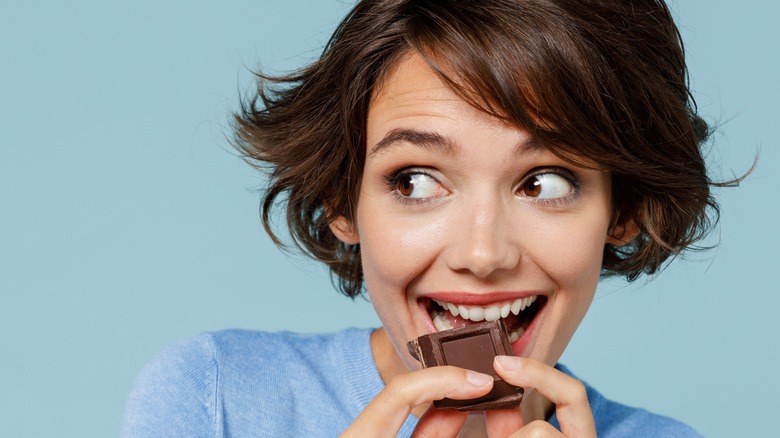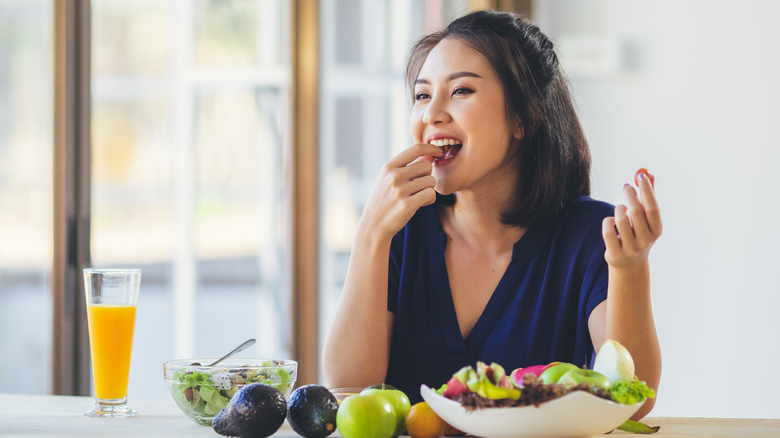Doctor Tells Us The Healthiest Ways To Cut Down On Sugar
We may receive a commission on purchases made from links.
Let's face it, sugar makes (almost) everything taste better. While some people love the taste of black coffee, if you don't love the bitter taste of coffee, a little teaspoon of sugar in coffee can make it sweeter. It's not just limited to sugar; now, you can find tons of flavored creamers to make your at-home coffee taste like you got it your favorite coffee shop. Every time we add something sweet to anything we eat or drink, we increase our sugar consumption.
According to the American Heart Association, the recommended amount of sugar intake for men is 36 grams and for women is 24 grams, but an average American adult consumes 77 grams of sugar daily. Consuming too much sugar can lead to cardiovascular diseases and type 2 diabetes; therefore, it is best to moderate your sugar intake to stay healthier. They reported that checking the nutrition label of packaged foods can help people make healthier choices since food manufacturers have been required to include the amount of added sugar since mid-2021.
A 2016 study showed that consuming too much added sugars can cause "non-alcoholic fatty liver disease (NAFLD) as well as cognitive decline and even some cancers." Once you're aware that overconsumption of sugar is bad for your health, you can take proactive steps to reduce your sugar intake. In an exclusive interview with The List, Dr. Mark J. Tager is telling us how to cut down our sugar intake the healthy way.
Dr. Mark J. Tager recommends avoiding these beverages
How often do you find yourself reaching out for soda when you're thirsty? Probably more often than not. To learn the healthiest ways to cut down our sugar intake, Dr. Mark J. Tager told The List, "The most obvious step is to eliminate sugar laden drinks from the diet and replace them with water or naturally flavored waters with little to no sugar added."
Did you know that beverages top the list as the source of added sugar? According to the American Heart Association, 47% of our added sugar consumption comes from drinks like soft drinks (25%), fruit juices (11%), coffee/tea (7%), and sports/energy drinks (3%). Snacks and sweets closely follow them at 31%.
For fruit juice lovers, Dr. Tager said, "You can also heavily dilute fruit juices with water, and this can be a good alternative." He added that so much sugar is hidden in processed foods; therefore, the most important thing any consumer can do is be vigilant in reading labels.
If you purchase any packaged food item from the grocery store, avoiding added sugar is hard unless it clearly mentions it has zero sugar. But then it could contact artificial sweeteners.
He told us, "Look for the line that says, 'added sugars.' My guess is you will be astounded by the amount in many packaged foods and condiments. Keep the 40 grams in mind and shoot for eating no more, and ideally less of this food additive."
Smart tips for cutting down sugar
It can be challenging to moderate your sugar intake when you consume many packaged items, and previously Dr. Mark J. Tager told us how sugar could accelerate the aging process. Therefore, being mindful of your food and drink selections can help your health in the long run.
Desserts are a tasty and a great way to treat yourself. However, most of them don't have a high nutritional value, so if you're craving sugar, you can choose healthier options like "a fresh fruit, Greek yogurt with cinnamon/fruit, or dark chocolate (70% cocoa or higher)," per Healthline. They also recommend choosing sauces that clearly state "no added sugar" as many kitchen sauces like chili sauce and spaghetti sauce have sugar in them. Choose the "unsweetened" versions or use fresh versions such as tomatoes instead of ketchup.
If you've just had your dinner and are craving something sweet, Carolyn Brown, registered dietician of Foodtrainers on Manhattan's Upper West Side, suggests trying fennel seeds that are "naturally sweet but don't contain any sugars" (via Eat This Not That). They help suppress your appetite and could also help with bloating, which could make sleeping easier. Otherwise, you can drink caffeine-free tea after dinner with a bit of honey or a small piece of dark chocolate for a little sweet treat.
To learn more about how sugar affects you, check out Dr. Mark J. Tager's book "Feed Your Skin Right: Your Personalized Nutrition Plan for Radiant Beauty."


